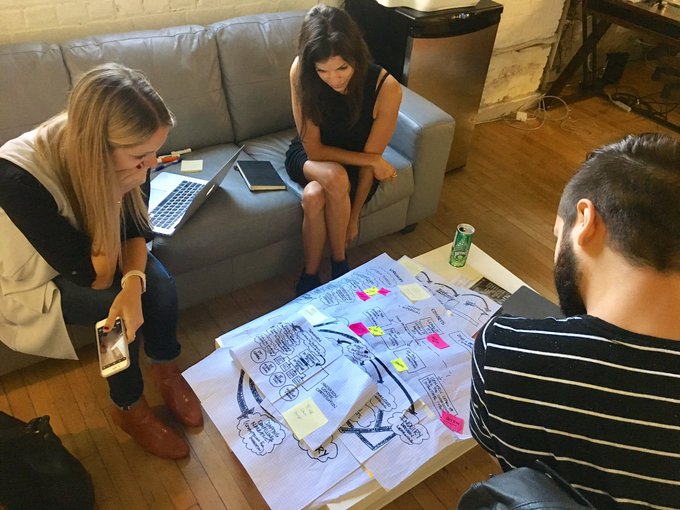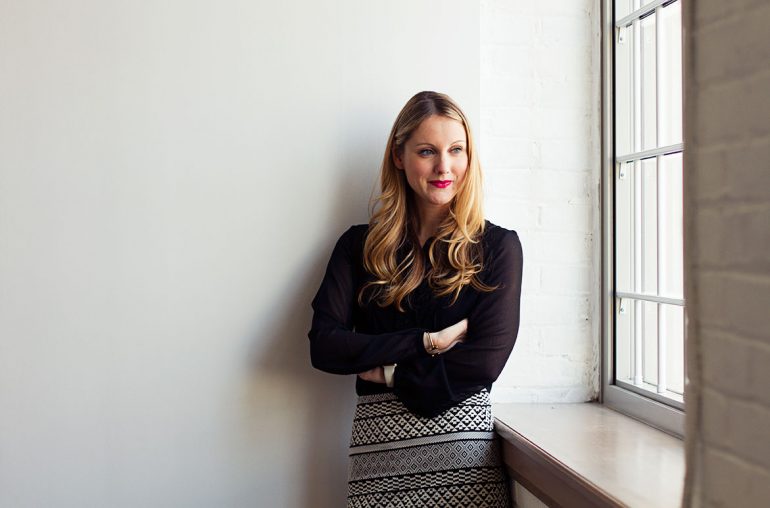As part of a regular series powered by Dell Small Business, BetaKit asks entrepreneurs to share lessons learned as they’ve grown their small business.
Successful small businesses often come from the least expected origins. Eighty-Eight’s Managing Director (and former BetaKit Managing Editor!) Erin Bury shares how the agency has grown from its roots as a social media management arm of a real estate company to owning a niche of online marketing and PR for tech clients.
How did you go about identifying the problem(s) that Eighty-Eight solves?
Eighty-Eight has an interesting origin story in that I wasn’t actually the founder—it started as a business unit of BuzzBuzzHome, which is a real estate software company.
All of their clients are real estate builders and they saw how the founders of BuzzBuzzHome were using social and digital marketing tools and said, “Hey we don’t understand this whole world of online marketing, can you just handle our marketing for us?”
“Being an entrepreneur is all about learning from other people’s mistakes so you don’t make the same ones.”
After more and more clients started asking for it, and more and more people on their side were assigned to handle these clients accounts, they kind of realized, “we accidentally started a marketing agency within our software company.” So that’s kind of when they realized they needed to bring someone in to actually form it into more of an official company and grow it. That’s when they approached me.
There was this huge gap between how startups did marketing and with larger businesses, who were so used to having budgets to do The Globe and Mail ads that they really had no reason to learn online marketing tactics. So that gap that existed between startup experts and big business marketing is where we found our sweet spot.
How did you validate that this approach was viable?
Over the past five years, we’ve slowly shifted away from real estate. Now, we’re almost exclusively working with people in the tech, small business, and startup ecosystems. And I think we really decided to focus there, number one, because my passion for the space and my expertise there, but secondarily because it’s an underserved market. You have this network of large agencies that have $25,000 a month minimum retainers and they’re just not able to work with startups because it doesn’t work with their business model, and that doesn’t work with the startup business model.
They also don’t speak the same language. I’ve talked to people in startups who have worked with the big agencies and [the big agencies] don’t use Google Docs and they don’t understand the difference between seed funding and Series A funding. We’ve found our sweet spot because we speak the language; we understand it. We’ve worked with countless startups and we know how to move quickly and we have budget minimums that are much friendlier to a small organization.
What were some of the biggest struggles you had getting Eighty-Eight off the ground in the early days?
I think one of the biggest challenges for service businesses is product market fit—what are the services that people are willing to pay the most for and how do you make sure that you’re the best at it?
I think pricing when it comes to services is an art, not a science, and there is no exact formula. I mean, roughly, you’re looking at how long will something take. What is the value of our time? And charging according to that.
We live in a world where you can go onto Fiverr and get a logo for five dollars. So turning around and charging $500 for our art director’s time—who is, in my opinion, the most talented designer in Toronto—and then being met with feedback that, “Oh well we could just hire someone for $100 to do this.” The biggest challenge is showing the value behind the service in a world where you can get everything for really, really cheap.

Also pricing versus your competitors. I think that we definitely are one of the only agencies that focuses on this niche, but there are millions of consultants and marketers and graphic designers and agencies out there. So sometimes you feel like you’re throwing your pricing out into the abyss and sometimes people come back and say, “Oh yeah, you’re totally in line with every other agency that we’ve had a quote from.” Sometimes you’re way lower and sometimes you’re way higher.
I think you just learn over time that pricing definitely is an art, not a science. And it’s an evolving thing. It’s not necessarily like a SaaS business where you set a price from day one and it’s really difficult to raise it later on because you’ve got this reputation with customers. I think agency pricing is something that is always changing and evolving as the agency grows because they’re charging more at 15 people than they were at two people, but it’s also what the market will bear.
How does Eighty-Eight define its culture and what does it do to foster that culture?
I think our culture is one of the things that I’m the most proud of at Eighty-Eight. I spend a lot of time thinking about it. We’re all millennials; I think we have a unique workforce in that sense, but I think that we have tried to create a culture that’s based on the things that millennials care about. So things like flexibility—having the ability to work from your cottage in the summer, or have work from home days, or summer Fridays, or no set office hours—as well as perks that I think go above and beyond what typical companies or agencies would have.
“I think our culture is also based on this idea that we treat people like adults. A lot of the trouble that people get into is when they try to manage their employees really closely.”
We were one of the first clients of Vacation Fund, which is a new Toronto startup that does vacation savings matching—kind of like RRSP-matching. They recognize that not only do millennials care about experiences and not necessarily retirement savings when they’re 23, but it’s super important to take vacations to avoid burnouts. They’re trying to tackle the problem of making it acceptable in a company to take vacation and helping employees pay for it, and we offer matching up to a certain amount.
I think our culture is also based on this idea that we treat people like adults. I think a lot of the trouble that people get into is when they try to manage their employees really closely. What time did they get to their desk? How many hours did they log in our time tracking system? And people don’t want to feel like they’re under someone’s thumb. Our motto is work until the work is done, and if that means if there’s a day where you’re done at 3, and you wanna go get your nails done, knock yourself out. But if I do ask you to stay and finish a client project once in a while, you do it with a smile.
Who do you look to for mentorship?
I worked for [BetaKit founder] Sarah Prevette for many years, so I definitely consider her my mentor in life and my career. She was the founder of Sprouter, and now currently the founder of Future Design School. When you hear the definition of an entrepreneur who always has ideas, always looking for the next thing, that’s definitely Sarah. She really taught me to fall in love with startups, and taught me about the world of entrepreneurship, and has been very helpful guiding me on that path.

My mom has also been a huge influence in my life. She was a marketing executive at Nortel for thirty-plus years, and I grew up sitting around the dinner table brainstorming ideas for the OS-192 fiber optic launch. Seeing her go to really amazing trade shows around the world in fiber optic technology—she definitely taught me how cool a marketing career could be, and the value of hard work, and the value of building a really awesome career. She’s still the first person I turn to when I have questions and need advice.
What do you think the next big trend in technology is? And how will it impact the way we work?
I’d say things like being able to work virtually. I see the future workforce being distributed and remote. I think when you look at what millennials care about—flexibility, and the ability to work remotely, and work on multiple projects at the same time is super key to them. And millennials will be the largest group in the workforce in the next few years so I think it’s tools that allow for remote work, video conferencing, and any online tool that helps you be connected.
But also just things that allow for workforces in general that are not necessarily the nine-to-five. I think the nine-to-five is going to be a thing of the past in the next 20 to 30 years. This idea of people working from multiple time zones, from multiple workplaces, and working collectively as one unit is going to be more integral. So, anything that helps people communicate easier when they’re not necessarily in vision.
What advice would you give to someone else who is just starting out as an entrepreneur?
There’s so much that’s unknown when you’re an entrepreneur for the first time. So my best advice is to find that support group from day one. And that includes a really great therapist. It includes a business coach. And maybe you can’t afford those things from day one, but it’s finding substitutes for them among your friends and family or your peers. Groups like StartupNorth, where you can go and look for advice, or Quora, where there’s information about people who have gone through the same thing.
To me, being an entrepreneur is all about learning from other people’s mistakes so you don’t make the same ones. And a lot of people make the same mistakes over, and over again because they haven’t necessarily gone outside their bubble and talked to people. They just think, I’m going to forge through this alone. For me, I have a therapist, I have an agency coach who’s an amazing business coach, I have my mentors. And I would not be able to run the business without them.
Erin Bury understands the value of connecting with mentors who understand her business. Dell Small Business appreciates the hard work and dedication that goes into running a small business. Contact a Dell Small Business Tech Advisor to get one-on-one advice and partnership to fuel your business’ growth.


